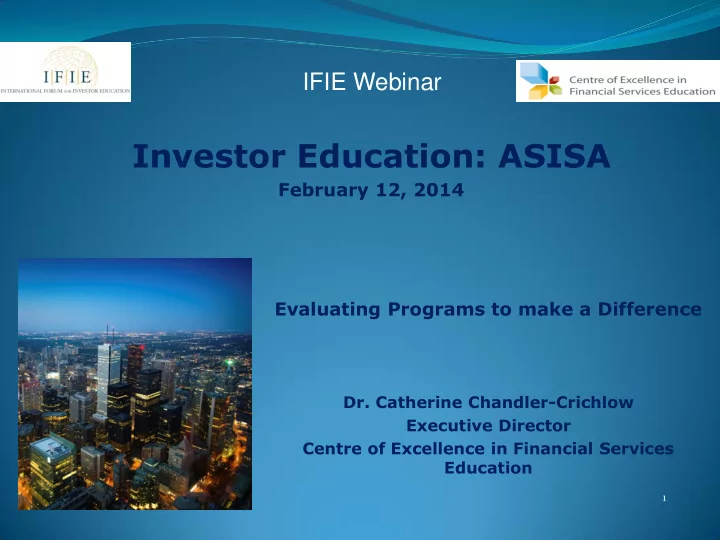

IFIE Webinar Investor Education: ASISA February 12, 2014 Evaluating Programs to make a Difference Dr. Catherine Chandler-Crichlow Executive Director Centre of Excellence in Financial Services Education 1
A process for linking Organizational Needs and Evaluation
Over-arching questions to assess outcomes Did the investment have impacts? ROI Did the program yield results? Impact Behaviour Did people change behaviours? Did people learn new information? Learning Reaction Did people like the program?
The Ownership of Investor Education Central Banks Industry Supervisory Investor Associations and Education Authorities SROs Independent Investor Education Entities
Characteristics of Investor Education Youth in high schools, colleges and universities Educators and curriculum developers Future investors Target Audience New and long-term retirees Employees Community groups Seasoned and new investors Basic money management Simple and complex financial products and services Content Focus Process for using investment products and services Incidence and nature of fraudulent or mis-selling practices Portfolio diversification and risk The role of investment firms Consumer financial literacy Enhanced investor education Increased consumer confidence Functioning of financial sectors Knowledge of investment products and risks Anticipated Outcomes Portfolio performance Improved financial capacity of a sector Making informed decisions Reduce financial fraud Understanding of economic principles
Alignment of Program Delivery and Evaluation for assessing learning outcomes ROI Impact Web-based Print & Electronic Media Behaviour Face-to-Face Advisories Brochures Learning Advisories Bulletins Brochures Conferences Bulletins Fact Sheets Fact Sheets Financial Literacy Radio Information Guides Curricula Television Investor Alerts Information Guides News Websites Investor Alerts Reaction Press Releases Magazines Press Releases Seminars
Alignment of Program Delivery and Evaluation for assessing behavioural outcomes ROI Web-based Print & Electronic Media Face-to-Face Impact Case Studies Information Guides Online chats Seminars Online Learning Interactive Bulletins Town Hall Meetings Modules Social Media: Facebook, Workshops Online Quizzes YouTube & Twitter Scenarios Behaviour Simulations Advisories Brochures Learning Advisories Bulletins Brochures Conferences Bulletins Fact Sheets Fact Sheets Financial Literacy Radio Information Guides Curricula Television Investor Alerts Information Guides News Websites Investor Alerts Reaction Press Releases Magazines Press Releases Seminars
Aligning evaluation to learner readiness Non- contemplation Contemplation Preparation Action Maintenance Assimilation Low Sophistication High Sophistication High Skepticism Low Skepticism
Characteristics of Investor Education Behavioural Change Levels Evaluation Considerations Conduct pre- and post-interviews to assess change to determine: How would you rate your knowledge of investment products? Do you currently have investments at a financial institution? If no investments currently, would you be interested in investing in financial products? If none or low level of investments, what factors might limit your use of Non-contemplation investment products? Contemplation Do you think that you have the required knowledge to choose products that are best suited to your needs? Preparation Have you participated in any investor education programs in the past? Taking Action If yes to participation in investor education, what was the learning format Maintenance used (e.g. Booklet, web-based course, seminar, workshop, etc.)? Assimilation If yes to participation in investor education, did completion of this session influence your interest in acquiring investments in financial products (could be new or advanced)? Since completing the investor education exercise, did you make new financial investments? Would you recommend others to complete the investor education that you did?
Recommendations Define the strategic intent of the program Identify the anticipated learning and behavioral change Develop process for pre- and post-program assessments Pre-plan timing for following up with target audiences Be pragmatic: TRY NOT TO BOIL THE OCEAN!!!
What gets planned gets measured What gets measured gets done…
Dr. Catherine Chandler-Crichlow Executive Director 12
Recommend
More recommend